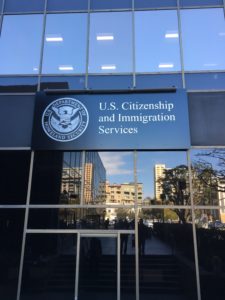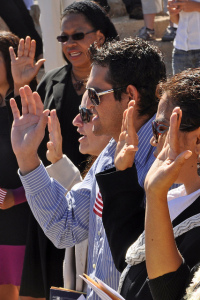
In general, to qualify for naturalization, you must have resided continuously in the U.S. for at least 5 years, as a permanent resident, to become eligible for naturalization. An exception is if you are a qualified spouse of a U.S. citizen, in which case your continuous residence must be at least 3 years to qualify for naturalization.
You must also maintain continuous residence from the time you file the Form N-400 up to the time of naturalization (i.e. take the naturalization oath and become a U.S. citizen).
Normally, you may file your naturalization application up to 90 days before reaching the 3/5-year continuous residence period. This is known as the 90 day early filing period.
Your LPR status begins when USCIS approves your adjustment application or when you are admitted to the U.S. on an immigrant visa. For certain groups, the start date of becoming an LPR may be earlier than the actual approval of the status (commonly referred to as a “rollback” date). For example, USCIS generally considers an asylee’s date of admission as an LPR to be one year prior to the date the adjustment application was approved.
Breaks in Continuity of Residence
Continuous residence involves your maintaining a permanent dwelling place or principal residence in the United States over the period of time required by the statute. The federal regulation defines residence as your domicile or principal actual dwelling place, without regard to your intent. The duration of your residence is calculated from the time you first establish residence in a particular location.
Thus, if you list a foreign residence and no concurrent U.S. physical address on the naturalization application, during the 3/5-year statutory period, you could face problems meeting this requirement.
If you broke the continuity of residence because you stayed abroad too long, you may not file your naturalization application as early as 90 days before you meet the continuous residence requirement.
Continuous residence relates to the time you resided lawfully in the U.S. without any single absence long enough to “break” continuity for naturalization. There are two types of absences from the U.S. that break the continuity of residence for purposes of naturalization:
1. Absence of more than 6 months but less than one year is presumed to break the continuity of residence.
Example: Melinda is absent from the U.S. from September 19, 2017 to June 26, 2018. Her absence of 280 days is presumed to break the continuity of residence because it lasted more than six months. Any time spent in the U.S. prior to September 19, 2017 presumably does not count toward her continuous residence.
She may, however, rebut the presumption of a break in continuous residence to be eligible for naturalization. She must provide evidence showing she did not disrupt her continuous residence during her stay abroad, such as keeping her job in the U.S. and not obtaining employment while abroad; maintaining a physical residence in the U.S. to which she retained full access (e.g. own or lease a home); and having immediate family members or strong family ties in the U.S.
Eligibility After Break in Continuous Residence (due to absence of more than 6 months but less than one year): Rebut presumption OR Wait at least until 6 months before reaching the end of the new statutory period
If the applicant is unable to rebut the presumption of a break in continuous residence, she must establish a new period of continuous residence to be eligible for naturalization.
Thus, if Melinda does not rebut the presumption of a break in continuous residence, she must wait until at least 6 months from reaching the 5-year anniversary of the new statutory period following her return to the United States. In this example, the new statutory period began on June 26, 2018, which is when Melinda returned to the United States. The earliest she may apply (or re-apply) for naturalization is December 26, 2022, i.e. at least 6 months from the end of the relevant statutory period.
2. Absence of one year or more (without an approved Form N-470, Application to Preserve Residence for Naturalization Purposes) absolutely breaks the continuity of residence.
Example: Jonas was absent from the United States from December 11, 2014 to January 11, 2016. His absence of 396 days absolutely breaks the continuity of residence because it lasted more than a year. Any time spent in the U.S. prior to December 11, 2014 does not count toward his continuous residence.
Unless the applicant has an approved Form N-470, Application to Preserve Residence for Naturalization Purposes, USCIS must deny a naturalization application for failure to meet the continuous residence requirement if the applicant has been continuously absent for a period of 1 year or more during the statutory period. A Form N-470 preserves residence for LPRs who have qualifying employment abroad with the U.S. government, private sector, or a religious organization.
Eligibility After Break in Continuous Residence (due to absence of one year or more): Four Years and One Day | Two Days and One Day OR Four Years and Six months | Two Years and Six Months
When there is an absolute break in continuous residence due to absence of one year or more:
You must wait at least 4 years and 1 day after re-entering and continuously residing in the U.S. to file for naturalization, if you are subject to the 5-year continuous residence requirement. (Once 4 years and 1 day have passed from the date of your return to the United States, the period of absence from the United States that occurred within the past 5 years is now less than 1 year.)
You must wait at least 2 years and 1 day after re-entering and continuously residing in the U.S. to file for naturalization, if you are subject to the 3-year continuous residence requirement. (Once 2 years and 1 day have passed from the date of your return to the United States, the period of absence from the United States that occurred within the past 3 years is now less than 1 year.)
Merely counting out 4 years and 1 day or 2 years and 1 day from your return to the U.S. — following an absence of 1 year or more — is not sufficient to determine whether you meet the continuous residence requirement. Because the period of absence within the past 5 years (or 3 years) is still more than 6 months, you must also overcome the presumption of a break in continuous residence.
But if you wait to apply for naturalization at least 4 years and 6 months (or 2 years and 6 months) after returning to the United States and reestablishing residence, there would not be a presumption of a break in residence. The reason is the period of absence preceding the N-400 application date is now less than 6 months.
How Absence from the United States During the Statutory Period Affects Eligibility to Naturalize:
| Duration of Absence | Must Applicant Overcome Presumption of a Break in the Continuity of Residence? | Eligible to Naturalize? |
|---|---|---|
| 6 months or less | No *(See Note 1 below) | Yes |
| More than 6 months but less than 1 year | Yes | Yes * (See Note 2 below) |
| 1 year or more (without USCIS approval via N-470 process) | Not eligible to apply | No |
*NOTE 1: Absences of less than 6 months may also break the continuous residence depending on the facts surrounding the absence. An example is if you claimed nonresident alien status to qualify for tax exemptions or if you failed to file income tax returns because you consider yourself a non-resident alien.
*NOTE 2: If you are unable to rebut the presumption of a break in continuous residence, you must wait to apply for naturalization at least 6 months before reaching the end of the relevant statutory period. Example: if you returned to the United States on June 26, 2018, following an absence of more than 6 months but less than 1 year — and you’re unable to rebut the presumption of a break in continuous residence — the earliest you may apply (or re-apply) for naturalization is December 26, 2022.
Length of Time Needed to Re-Establish Eligibility for Naturalization and Residence in the United States Following An Absence of 1 Year or More:
| Provision | Absence During Statutory Period | May Apply for Naturalization After… |
|---|---|---|
| INA 316 5-year statutory period | More than 1 year | 4 years and 6 months, OR 4 years and 1 day (but must overcome presumption of break in continuous residence) |
| INA 319 3-year statutory period | More than 1 year | 2 years and 6 months, OR 2 years and 1 day (but must overcome presumption of break in continuous residence) |
Permanent dwelling place in the U.S.
You must have the intent to maintain lawful permanent resident status and consider all absences from the U.S. to be fixed, temporary visits abroad. Lengthy or frequent absences from the U.S. may result in a denial of naturalization due to abandonment of LPR status.
USCIS will consider the entire period from the LPR admission until the present when determining whether you meet the continuous residence requirement. It will focus mostly on whether you maintained continuous residence (permanent dwelling place) in the United States during the statutory period.
If you have taken a trip outside the U.S. that lasted 6 months or more since becoming a permanent resident, you should have evidence that you continued to maintain a permanent dwelling/physical address in the United States and kept ties to the U.S. during your absence.
Frequent trips or stays abroad, even when each lasted less than six months, can also create problems. If you’re not able to show your principal actual dwelling place is in the United States or show residence within the United States for the statutory period, USCIS may find that you do not meet the continuous residence requirement, even if all of your individual absences were under 6 months.
For more information on eligibility for naturalization, read our related article, 5 Questions to Ask Yourself Before You File for Naturalization (U.S. Citizenship). Consult a U.S. immigration attorney to verify when you may file for naturalization, especially if you had a trip abroad lasting more than 6 months during the statutory period.
This article provides general information only. It is based on law, regulations and policy that are subject to change. Do not consider it as legal advice for any individual case or situation. Each legal case is different and case examples do not constitute a prediction or guarantee of success or failure in any other case. The sharing or receipt of this information does not create an attorney-client relationship.


 Before you file a Form N-400, Application for Naturalization, to obtain U.S. citizenship, there are five key questions to ask yourself. Your answers will help you determine whether you qualify for naturalization and may become a naturalized U.S. citizen.
Before you file a Form N-400, Application for Naturalization, to obtain U.S. citizenship, there are five key questions to ask yourself. Your answers will help you determine whether you qualify for naturalization and may become a naturalized U.S. citizen. green card. Becoming a U.S. citizen is generally recommended: you get to vote for elected officials, obtain federal jobs, sponsor immediate relatives for green cards, travel freely with a U.S. passport, and gain immunity from deportation or removal.
green card. Becoming a U.S. citizen is generally recommended: you get to vote for elected officials, obtain federal jobs, sponsor immediate relatives for green cards, travel freely with a U.S. passport, and gain immunity from deportation or removal.